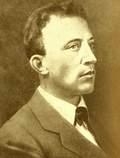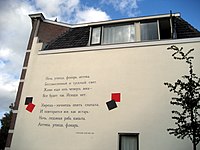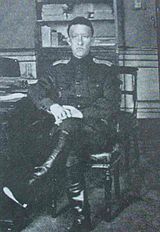| Alexander Alexandrovich Blok | |||||
| yà lì shān dà · yà lì shān dé luó wéi qí · bù luò kè | |||||
| bó luò kè | |||||
| chūshēngdì: | shèng bǐ dé bǎo | ||||
yuèdòuyà lì shān dà · bó luò kè Alexander Blokzài诗海dezuòpǐn!!! | |||||
1904年出版的《美妇人诗集》是他的成名作和早期代表作,充满神秘主义和唯美主义色彩。勃洛克因此一跃成为当时俄国象征主义诗歌流派的代表人物。1905年的俄国革命促使勃洛克的创作发生了转折,他逐渐开始面向现实社会,发展成为十月社会主义革命的热忱歌手。长诗《十二今》就是诗人献给伟大十月的艺术杰作,他运用象征主义方法歌颂革命时代的精神,揭示旧世界灭亡的必然性,预示新生活的广阔前景。勃洛克的创作开拓了苏维埃文学的道路,对现代诗歌也产生了巨大的影响。
1904年出版的诗集《美妇人诗集》显示了诗人的艺术独创性。1905年革命促使他接近社会生活,他的诗集《意外的喜悦》和《夜晚时分》、组诗《法伊娜》、长诗《报应》和《夜莺花园》、剧本《命运之歌》等,表达了诗人对现实生活的关注和对祖国的热爱。
1905年革命促使他接近社会生活,此时写下的《饱汉》(1905)、《俄罗斯》(1908)、《夜晚的时辰》(1911)等,表达了诗人对生活和祖国的热爱之情。
十月革命后,勃洛克从事文化宣传工作。在1918年写的文章《知识分子与革命》中呼吁知识分子"以整个身体、整个心灵、整个意识谛听革命",预言俄罗斯将成为一个伟大的新型国家。同年创作的长诗《十二个》是他的代表作,也是描写十月革命的第一首长诗,在苏联诗歌史上占有重要地位。《十二个》显示了十月革命胜利初期彼得堡的独特的生活氛围,象征性地表现了革命所向披靡的气势。诗作写作技艺精湛,格调高昂,带有象征主义诗歌的特色。此外,勃洛克还写有政治抒情长待《野蛮人》等许多优秀作品。
晚年尽全力参加高尔基创办的“世界文学丛书”的出版工作和其他文学活动,为苏维埃文化工作做出了杰出的贡献。他是苏联诗歌史上占有重要地位的大诗人。
Life and career
Blok was born in Saint Petersburg, into an intellectual family of Alexander Lvovich Blok and Alexandra Andreevna Beketova. His father was a law professor in Warsaw, and his maternal grandfather, Andrey Beketov, was a famous botanist and the rector of Saint Petersburg State University. After his parents' separation, Blok lived with aristocratic relatives at the manor Shakhmatovo near Moscow, where he discovered the philosophy of Vladimir Solovyov, and the verse of then-obscure 19th-century poets, Fyodor Tyutchev and Afanasy Fet. These influences would affect his early publications, later collected in the book Ante Lucem.
In 1903 he married the actress Lyubov (Lyuba) Dmitrievna Mendeleeva, daughter of the renowned chemist Dmitri Mendeleev. Later, she would involve him in a complicated love-hate relationship with his fellow Symbolist Andrei Bely. To Lyuba he dedicated a cycle of poetry that made him famous, Stikhi o prekrasnoi Dame (Verses About the Beautiful Lady, 1904).
Night, street and streetlight, drug store,
The purposeless, half-dim, drab light.
For all the use live on a quarter century –
Nothing will change. There's no way out.
You'll die – and start all over, live twice,
Everything repeats itself, just as it was:
Night, the canal's rippled icy surface,
The drug store, the street, and streetlight.
"Night, street and streetlight, drugstore..." (1912) Trans. by Alex Cigale
Blok enthusiastically greeted the 1905 Russian Revolution. During the last period of his life, Blok emphasised political themes, pondering the messianic destiny of his country (Vozmezdie, 1910–21; Rodina, 1907–16; Skify, 1918). In 1906 he wrote an encomium to Mikhail Bakunin. Influenced by Solovyov's doctrines, he had vague apocalyptic apprehensions and often vacillated between hope and despair. "I feel that a great event was coming, but what it was exactly was not revealed to me", he wrote in his diary during the summer of 1917. Quite unexpectedly for most of his admirers, he accepted the October Revolution as the final resolution of these apocalyptic yearnings.
In May 1917 Blok was appointed as a stenographer for the Extraordinary Commission to investigate illegal actions ex officio Ministers or to transcribe the (Thirteenth Section's) interrogations of those who knew Grigori Rasputin. According to Orlando Figes he was only present at the interrogation.
By 1921 Blok had become disillusioned with the Russian Revolution. He did not write any poetry for three years. He complained to Maksim Gorky that his "faith in the wisdom of humanity" had ended, and explained to his friend Korney Chukovsky why he could not write poetry any more: "All sounds have stopped. Can't you hear that there are no longer any sounds?" Within a few days Blok became sick. His doctors requested that he be sent abroad for medical treatment, but he was not allowed to leave the country. Gorky pleaded for a visa. On 29 May 1921, he wrote to Anatoly Lunacharsky: "Blok is Russia's finest poet. If you forbid him to go abroad, and he dies, you and your comrades will be guilty of his death". A resolution on departure for Blok was signed by members of the Political Bureau of the Central Committee on 23 July 1921. But on 29 July Gorky asked permission for Blok's wife to accompany him, since Blok's health had deteriorated sharply. Permission for Liubov' Dmitrievna Blok to leave Russia was signed by Molotov on 1 August 1921, but Gorky was notified only on 6 August. The permission was delivered on 10 August, after Blok had already died.
Several months earlier, Blok had delivered a celebrated lecture on Alexander Pushkin, the memory of whom he believed to be capable of uniting White and Soviet Russian factions.
Work
The idealized mystical images presented in his first book helped establish Blok as a major poet of the Russian Symbolism style. Blok's early verse is musical, but he later sought to introduce daring rhythmic patterns and uneven beats into his poetry. Poetical inspiration was natural for him, often producing unforgettable, otherworldly images out of the most banal surroundings and trivial events (Fabrika, 1903). Consequently, his mature poems are often based on the conflict between the Platonic theory of ideal beauty and the disappointing reality of foul industrialism (Little Mess, 1906).
The description of St Petersburg he crafted for his next collection of poems, The City (1904–08), was both impressionistic and eerie. Subsequent collections, Faina and the Mask of Snow, helped augment Blok's reputation. He was often compared with Alexander Pushkin, and is considered perhaps the most important poet of the Silver Age of Russian Poetry. During the 1910s, Blok was admired greatly by literary colleagues, and his influence on younger poets was virtually unsurpassed. Anna Akhmatova, Marina Tsvetaeva, Boris Pasternak, and Vladimir Nabokov wrote important verse tributes to Blok.
Blok expressed his opinions about the revolution by the enigmatic poem "The Twelve” (1918). The long poem exhibits "mood-creating sounds, polyphonic rhythms, and harsh, slangy language" (as the Encyclopædia Britannica termed it). It describes the march of twelve Bolshevik soldiers (likened to the Twelve Apostles of Christ) through the streets of revolutionary Petrograd, with a fierce winter blizzard raging around them. "The Twelve" alienated Blok from many of his intellectual readers (who accused him of lack of artistry), while the Bolsheviks scorned his former mysticism and asceticism. Searching for modern language and new images, Blok used unusual sources for the poetry of Symbolism: urban folklore, ballads (songs of a sentimental nature) and ditties ("chastushka"). He was inspired by the popular chansonnier Mikhail Savoyarov, whose concerts during the years 1915–1920 were visited often by Blok. Academician Viktor Shklovsky noted that the poem is written in criminal language and in ironic style, similar to Savoyarov's couplets, by which Blok imitated the slang of 1918 Petrograd.
Musical settings
- Dmitri Shostakovich wrote a late song cycle for soprano and piano trio, Seven Romances on Poems by Alexander Blok, Op. 127.
- Mieczysław Weinberg wrote a song cycle for soprano and piano, Beyond the Border of Past Days, Op. 50.
- Arthur Lourié wrote a choral cantata, In the Sanctuary of Golden Dreams.
- Alexander Blok was a favourite poet of Georgy Sviridov; such works as "Petersburg" (a vocal poem), "Nightly Clouds" (cantata) and "Songs From Hard Times" (concerto) were written to Blok's poetry.
References
- ^ White, Duffield (1991). "Blok's Nechaiannaia Radosť". Slavic Review. 50 (4): 779–791. doi:10.2307/2500461. JSTOR 2500461.
- ^ Toscano, Alberto (2017). "The Broken Music of the Revolution: Trotsky and Blok". Crisis and Critique. 4 (2): 404–426.
- ^ The Rasputin File by Edvard Radzinsky
- ^ "Archived item". Archived from the original on 2014-12-09. Retrieved 2014-04-22.
- ^ "Interpreting the Russian Revolution: The Language and Symbols of 1917". www.worldcat.org.
- ^ a b c Orlando Figes. A People's Tragedy: The Russian Revolution 1891-1924, 1996, ISBN 0-7126-7327-X, pp 784-785
- ^ Pavel Fokin, Sv.Poliakova (2008). Blok without gloss. Saint Petersburg: Amphora. p. 360.
- ^ ed. Ouvarova (2000). Encyclopedia of Russian Variety Art, XX century. Moscow: «Rospen».
- ^ Viktor Shklovsky The Writing Table // The Hamburg Account: articles, memoirs, essays (1914-1933), Moscow, Sovetsky Pisatel, 1990. ISBN 5-265-00951-5, ISBN 978-5-265-00951-7.
External links
- Works by or about Alexander Blok at Internet Archive
- Works by Alexander Blok at LibriVox (public domain audiobooks)

- Translations into English
- The Poems by Alexander Blok (with Russian originals, also some in German, French, Spanish, Italian, Dutch, Bulgarian, etc.)
- Collection of Alexander Blok's poems in English (with Russian originals)
- 4 short poems, translated by Alex Cigale. University of Albany. Retrieved 2010-10-28
- A night, a street (Ноць, улицаб, фонарь, аптека)
- Dark Maiden (Чёрная Дева)
- The Lady Unknown (Незнакомка), translation by Dina Belyayeva
- Alexander Blok poetry (Russian texts)
- Reviews, crtiticism and analysis
- "Died and survived" review of new works published on Blok By Simon Karlinsky. 9 May 1982 The New York Times. Retrieved 2010-10-28
- Essay on Blok's poem "the Twelve", Maria Carlson, University of Kansas. Retrieved 2010-10-28
- Essay on Blok by Leon Trotsky (Chapter 3 of Literature and Revolution). Retrieved 2010-10-28
- Rykov A. Politics of Modernism. Nikolay Punin and Alexander Blok
- Struve, Gleb (November 1946). "Blok and Gumilyov: A double anniversary". The Slavonic and East European Review. 25 (64).




